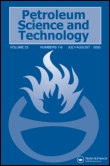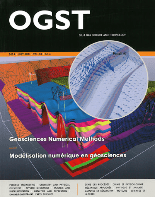
SPE Production & Operations
Scope & Guideline
Unlocking Insights in Energy Engineering
Introduction
Aims and Scopes
- Production Optimization:
The journal covers various approaches to optimize production processes in oil and gas fields, including reservoir management, well performance analysis, and enhanced oil recovery techniques. - Technological Innovations:
It emphasizes the development and application of novel technologies, such as advanced sensors, data analytics, and computational modeling, to improve operational efficiency and reduce environmental impact. - Sustainability and Environmental Management:
Research on sustainability metrics, methane emissions reduction, and produced water management reflects a growing commitment to environmental stewardship within the industry. - Fluid Dynamics and Flow Assurance:
The journal publishes studies on multiphase flow, fluid dynamics, and associated challenges such as scaling, emulsion management, and drag reduction, which are crucial for efficient production. - Geomechanical and Hydraulic Fracturing Studies:
A core area of focus includes geomechanical modeling and hydraulic fracturing technology, exploring the interaction between reservoir characteristics and fracturing processes.
Trending and Emerging
- Data Analytics and Machine Learning Applications:
There is a significant increase in research utilizing data analytics and machine learning to enhance decision-making processes in production operations, optimize reservoir management, and predict production outcomes. - Sustainable Practices and Emission Reduction:
Emerging themes focus on sustainability practices, including methane emissions quantification and monitoring, reflecting an industry-wide shift toward environmentally responsible operations. - Remote Sensing and Advanced Monitoring Technologies:
The use of remote sensing and advanced monitoring technologies for leak detection, production monitoring, and environmental assessment is gaining traction, showcasing the industry's adaptation to digital transformation. - Integrated Approaches to Reservoir Management:
A trend towards integrated approaches that combine geomechanical modeling, hydraulic fracturing, and real-time data analytics is emerging, indicating a holistic view of reservoir management. - Innovations in Flow Assurance:
Research on flow assurance, including studies on drag reduction and multiphase flow optimization, is trending, highlighting the industry's focus on improving flow dynamics and reducing operational challenges.
Declining or Waning
- Traditional Oil Recovery Techniques:
There is a noticeable decline in publications focusing on conventional oil recovery methods, suggesting a shift towards more advanced and innovative approaches, such as enhanced oil recovery (EOR) techniques. - Static Reservoir Characterization:
Research centered on static or traditional methods of reservoir characterization is becoming less frequent, likely due to the industry's movement towards dynamic modeling and real-time data acquisition technologies. - Conventional Drilling Techniques:
As the industry increasingly adopts new drilling technologies and methodologies, papers focusing on conventional drilling techniques are appearing less frequently in recent publications.
Similar Journals

PETROLEUM SCIENCE AND TECHNOLOGY
Exploring the intersection of engineering and energy technology.PETROLEUM SCIENCE AND TECHNOLOGY, published by Taylor & Francis Inc, is a pivotal journal dedicated to advancing the multidisciplinary field of petroleum engineering and related technologies. With an ISSN of 1091-6466 and an E-ISSN of 1532-2459, this journal serves as a vital platform for disseminating research in areas ranging from geotechnical engineering to energy technology. As of 2023, it is recognized in the Q3 quartile across several categories, including Chemical Engineering and Fuel Technology, signifying its respectable standing within the academic community. With a convergence timeline from 1997 to 2024, the journal continuously addresses crucial issues in the energy sector, making it essential reading for researchers, industry professionals, and policy-makers alike. Although not an open access journal, its rigorous peer-reviewed articles contribute significantly to the advancement of knowledge and innovation within these fields, reflecting the journal's commitment to promoting scientific understanding and practical applications.

SPE JOURNAL
Pioneering Research in Energy and Geotechnical EngineeringSPE JOURNAL, published by the Society of Petroleum Engineers, is a leading academic journal that provides a platform for the dissemination of high-quality research in the fields of energy engineering, geotechnical engineering, and engineering geology. With a solid impact demonstrated by its Q1 ranking in both Energy Engineering and Power Technology, as well as Geotechnical Engineering, the journal is well-positioned to influence advancements in sustainable energy practices and geotechnical methodologies. Covering research from 1969 through 2024, the SPE JOURNAL is dedicated to publishing innovative studies that contribute to the field's body of knowledge while addressing the challenges facing the global energy landscape. Though it does not offer open access, the journal’s rigorous peer-review process ensures that published works are of the highest academic quality, making it an essential resource for researchers, professionals, and students alike aiming to stay at the forefront of energy and geotechnical developments.

Oil & Gas Science and Technology-Revue d IFP Energies nouvelles
Exploring Breakthroughs in Oil and Gas TechnologiesOil & Gas Science and Technology - Revue d'IFP Energies nouvelles, published by EDP SCIENCES S A, is a distinguished journal in the field of energy science, specifically focusing on the latest advancements in oil and gas technologies. Since its transition to Open Access in 1997, the journal has been dedicated to disseminating high-quality research that addresses the challenges and innovations inherent in energy engineering and fuels. With an ISSN of 1294-4475 and an E-ISSN of 1953-8189, this journal holds a significant position in academic circles, reflecting its contributions to sustainable energy solutions. The journal's rankings in Scopus showcase its impact, particularly in the areas of Energy Engineering and Power Technology (Rank #105/224), Chemical Engineering (Rank #131/279), and Fuel Technology (Rank #51/100). As a pivotal resource for researchers, professionals, and students, it aims to foster knowledge exchange and promote innovative technologies essential for the ongoing evolution of the energy sector.

SPE RESERVOIR EVALUATION & ENGINEERING
Empowering Energy Professionals with Cutting-Edge ResearchSPE RESERVOIR EVALUATION & ENGINEERING, published by the Society of Petroleum Engineers, is a leading academic journal that plays a pivotal role in the fields of energy engineering and geology. With a notable Q2 ranking in Energy Engineering, Fuel Technology, and Energy (Miscellaneous), as well as a Q1 ranking in Geology, this journal is recognized for its high-quality, peer-reviewed research contributions that enhance our understanding of reservoir evaluation and engineering practices. Since its inception in 1999, the journal has aimed to disseminate innovative techniques and methodologies applicable to both academia and industry. Available in both print (ISSN: 1094-6470) and online (E-ISSN: 1930-0212) formats, it ensures wide accessibility to its content even as it embraces Open Access options for select titles. Researchers, professionals, and students alike can benefit from the rich repository of technical papers, case studies, and reviews, all designed to advance knowledge and applications in the ever-evolving energy sector.

Geoenergy Science and Engineering
Transforming Research into Sustainable PracticesGeoenergy Science and Engineering, published by Elsevier in the Netherlands, is a burgeoning academic journal dedicated to the interdisciplinary exploration of geoenergy technologies. With ISSN 2949-8929 and E-ISSN 2949-8910, the journal serves as a crucial platform for disseminating research and advancements in the fields of energy engineering, geotechnical engineering, and sustainable energy practices. Spanning years from 2023 to 2024, it aims to publish high-quality original research, reviews, and case studies that address the pressing challenges and innovations within the realm of geoenergy. Although the journal currently holds modest Scopus rankings, it is poised to increase its impact and recognition in its respective fields, making it an essential resource for researchers, professionals, and students engaged in the urgent quest for sustainable energy solutions.

PRODUCTION AND OPERATIONS MANAGEMENT
Transforming Practices in Production ManagementPRODUCTION AND OPERATIONS MANAGEMENT is a leading academic journal published by SAGE Publications Inc., focusing on the dynamic fields of production and operations management. With its ISSN 1059-1478 and E-ISSN 1937-5956, this esteemed journal caters to a global audience of researchers, practitioners, and students in the United States and beyond. Recognized for its high impact, it boasts a Q1 category ranking in crucial areas such as Industrial and Manufacturing Engineering, Management of Technology and Innovation, and Management Science and Operations Research as of 2023. This impressive standing underlines its commitment to publishing groundbreaking research that informs best practices and paves the way for innovation within the industry. The journal is particularly instrumental in fostering the exchange of knowledge and insights that drive operational efficiency and effectiveness in a rapidly evolving technological landscape. Despite the absence of an open access option, the journal maintains a significant academic presence, ensuring that vital research remains accessible to a dedicated readership. With coverage spanning from 1992 to 2024, PRODUCTION AND OPERATIONS MANAGEMENT is an essential resource for those seeking to advance their understanding and application of principles that shape production and operational frameworks.

CHEMICAL AND PETROLEUM ENGINEERING
Empowering Research for a Sustainable FutureChemical and Petroleum Engineering is a prestigious academic journal dedicated to the advancement of knowledge in the fields of chemical engineering and petroleum technologies. Published by Springer, this journal serves as a vital resource for researchers, professionals, and students interested in the intricate processes and innovations that drive these industries. With an ISSN of 0009-2355 and an E-ISSN of 1573-8329, it has established a notable presence since its inception in 1965. Throughout its converged years, the journal has continually published impactful research that contributes to sustainability and efficiency within the sectors. Although it holds a Q3 ranking in Chemical Engineering and Fuel Technology and a Q4 ranking in Energy Engineering and Geochemistry, it is a noteworthy platform for emerging studies, fostering connections among scholars. Readers will find a wealth of information and ideas, but please note that this journal does not currently offer open access options. For those passionate about chemical and petroleum engineering, this journal is an essential part of staying informed and engaged with the latest scientific advancements.

Petroleum Exploration and Development
Pioneering Discoveries in Geology and GeochemistryPetroleum Exploration and Development is a premier open-access journal published by KEAI PUBLISHING LTD, dedicated to advancing the fields of petroleum exploration and extraction as well as associated technologies. Since its inception in 2008, the journal has established itself as a key resource for researchers and professionals across various disciplines, evidenced by its impressive Q1 rankings in multiple categories including Economic Geology and Energy Engineering. With an impact factor that reflects its high citation rates and academic significance, this journal offers a unique platform for disseminating cutting-edge research related to geological studies, geochemistry, and energy sustainability. By making all its content freely accessible, Petroleum Exploration and Development ensures that its findings are available to a global audience, fostering collaboration and innovation within the community. Researchers, industry professionals, and students will find valuable insights and advancements in the realm of petroleum science, making it an essential part of their academic and professional libraries.

SOCAR Proceedings
Cultivating Excellence in Applied Mathematics and Geosciences.SOCAR Proceedings is a distinguished academic journal published by the State Oil Company of the Azerbaijan Republic, specifically from the Oil Gas Scientific Research Project Institute. This journal addresses vital aspects of various interdisciplinary fields including Applied Mathematics, Chemical Engineering, Energy Engineering, and Geosciences, making it an essential resource for researchers and professionals alike. Since its inception in 2010, SOCAR Proceedings has cultivated significant contributions to the knowledge base, particularly as it boasts a respectable Q3 category ranking across several relevant fields for 2023. As a journal known for its commitment to disseminating innovative research, it offers invaluable insights into the energy sector that are particularly pertinent to the regional and global challenges posed by resource management and environmental sustainability. With an evolving focus up to 2024, SOCAR Proceedings continues to foster scholarly dialogue and research advancements, making it a vital forum for students and academics looking to deepen their understanding of energy and engineering sciences.

CHEMISTRY AND TECHNOLOGY OF FUELS AND OILS
Pioneering Research in Fuels and Oils for Sustainable ProgressCHEMISTRY AND TECHNOLOGY OF FUELS AND OILS, published by SPRINGER, is a pivotal journal dedicated to advancing the understanding and technologies surrounding fuels and oils. With its ISSN 0009-3092 and E-ISSN 1573-8310, this journal has been a reliable resource in the field since its inception in 1965, providing insights into the latest research and developments up until 2024. While it currently holds a Q4 status across various quartiles, including Chemical Engineering and Fuel Technology as of 2023, the journal's commitment to disseminating valuable knowledge plays a crucial role in nurturing the academic discourse surrounding energy and chemical processes. Although it does not offer Open Access, the journal is critical for researchers, professionals, and students aiming to deepen their expertise in energy engineering, chemical engineering, and fuel technology. Its contributions underlie significant advancements in sustainable energy practices and fuel innovations, making it an essential read for those engaged in these crucial scientific domains.